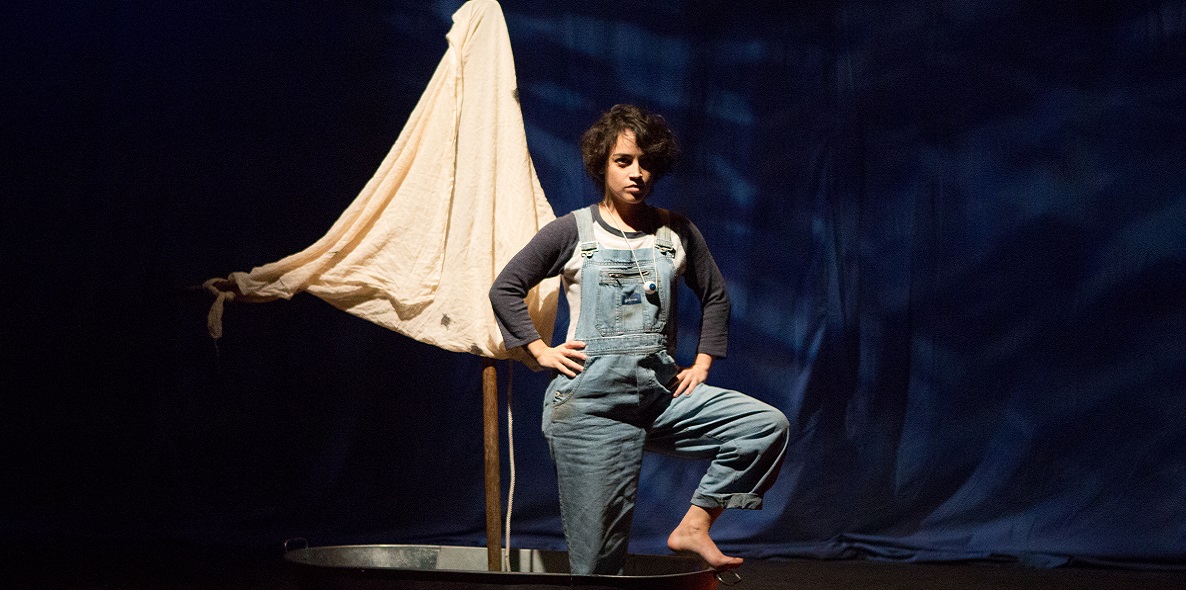
Perfecting performance
Last week final-year students from BA (Hons) Performance received a visit from Hannah Bevan and Chris Duncan from Nuffield Laboratory, who offered them advice on the practicalities of starting their own theatre companies and how to make it in this competitive industry.
Last week final-year students from BA (Hons) Performance received a visit from Hannah Bevan and Chris Duncan from Nuffield Laboratory, who offered them advice on the practicalities of starting their own theatre companies and how to make it in this competitive industry.
Maggie Tarver, Solent’s Course Leader of BA (Hons) Performance, said: “It is crucial that final-year students get to understand, first-hand, what will be expected of them in the industry, and what opportunities there are for them in the performing arts. Industry guest speakers offer a different perspective on students’ career options.”
Nuffield Laboratory is a creative development programme based at Nuffield Theatre in Southampton, allowing artists to test ideas and productions and, in doing so, discover different ways of performing the piece. This kind of testing helps actors, directors and all involved with the piece to push the boundaries of the performance and make sure the production is as effective as it can be.
This kind of creative innovation in drama is in line with Solent’s own ethos; as well as access to industry professionals, Solent performance students can learn an exclusive acting method called the Perdekamp Emotional Method – a method currently only offered by one other institution in the UK.
We talk to Nuffield’s Hannah and Chris to find out about the importance of testing theatre productions, and to get their top tips for students looking to break into the industry.
What have you come to talk to the students about?
The main thing we talked about today was advising students on how they can make and produce their own work. It fitted in very closely with their current course, which is on devising their own theatre and teaches them how to go about starting their own theatre companies. Some of them already have their own theatre company names, so it is great to see that they are raring to go.
Tell us more about the Nuffield Laboratory
The Nuffield Laboratory is part of the creative output of the Nuffield, but it specifically looks at new work and new talent development. We do a number of things, from talking to the students today through to working with professional artists who are creating a new piece of work and want to test it out. We support lots of different artists and companies throughout the course of the year, as well as developing new work for the Nuffield stage.
How important do you think it is for actors and producers to have the opportunity to test performances in a laboratory environment?
The Nuffield Laboratory is at the core of what Nuffield does; it invests in trialling, testing and researching new work. Its main purpose is to provide ways for people to do those things in an environment that is made for it.
The testing element of the Nuffield Laboratory helps to widen people’s knowledge, as well as allowing us to look at the processes of making theatre.
What would you say is the biggest career challenge for students trying to make it in the theatre industry, and how do they overcome it?
The challenge for students coming into the theatre industry is the volume of people all doing the same thing. One way to overcome the challenge and the competition is to research – who has graduate schemes? who runs emerging artists programmes? – and to start conversations with those companies and venues. Join theatre networks and attend open discussions on theatre. Keep an eye on open auditions. The more you can fill your CV with professional experience, the more you will start to stand out from everyone else.
What top three pieces of advice would you offer to our students?
- See everything: the good, the bad, the ugly and gorgeous. The more you understand why a piece is all these things, the better informed you’ll become in knowing your own artistic tastes, practise and it’ll expand your knowledge of who is making theatre and where. It’ll also help you to have fluent conversations with other people in theatre and feel confident when networking.
- Have facts at your fingertips: Know your project and company inside out, and have your ‘elevator pitch’ ready for funders, venues and programmers all the time. You’ll often need to be able to provide audience figures, financial details, or participation data to support your pitch, so make sure you know them!
- Don’t wait – do! Sometimes you need to just get on and make the theatre you want to make. Trust your instincts and have fun being the artist you want to be.




